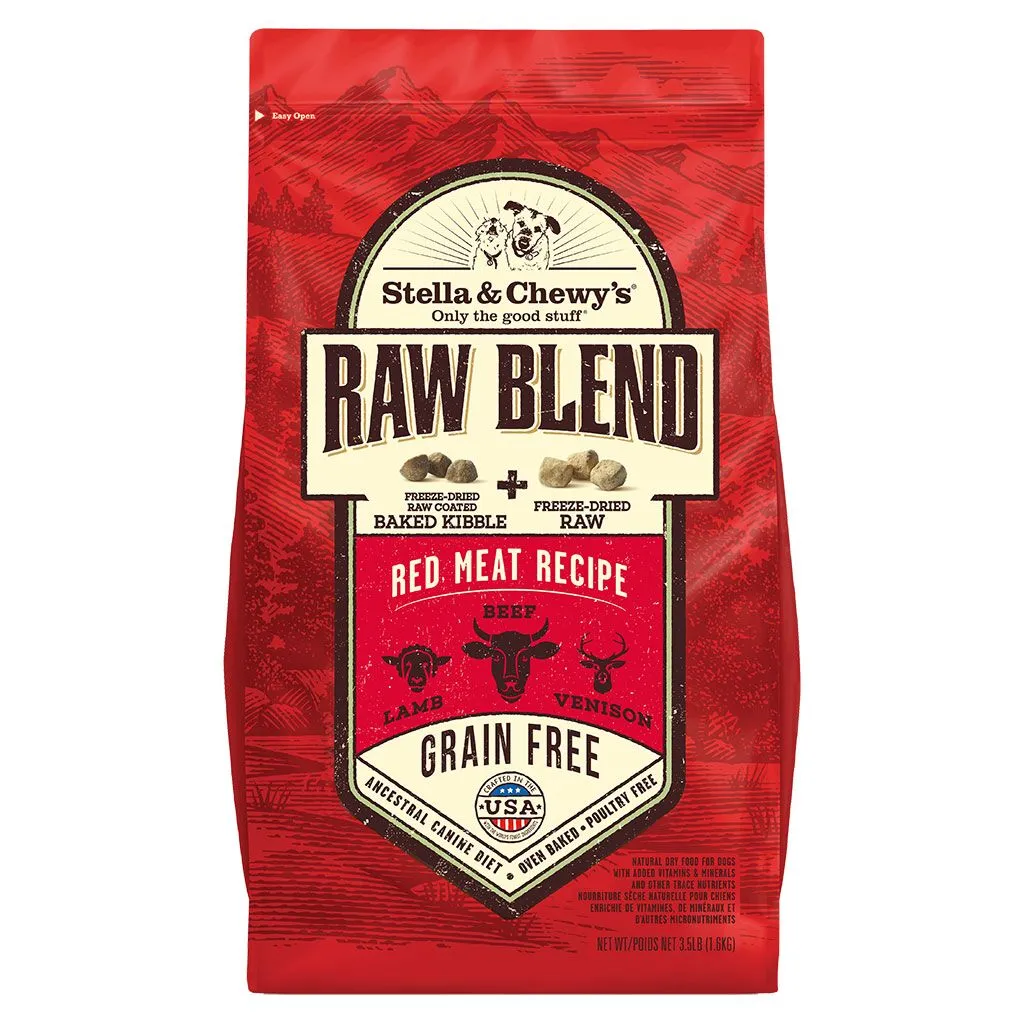
DogFoodAdvisor is reader supported See how
All reviews are 100% impartial but if you buy using links on this page, we may earn a referral fee.
Our Verdict
Stella and Chewy’s Raw Blend dry product range is made up of seven recipes which each receive the Dog Food Advisor’s rating, 5 stars.
The table below shows each recipe in this range including our rating and the AAFCO nutrient profile: Growth (puppy), Maintenance (adult), All Life Stages, Supplemental or Unspecified.
| Product line | Rating | AAFCO |
|---|---|---|
| Stella & Chewy's Raw Blend Cage-Free Recipe | 5 | A |
| Stella & Chewy's Raw Blend Wholesome Grains Cage-Free Recipe with Pumpkin and Quinoa | 5 | A |
| Stella & Chewy's Raw Blend Free-Range Recipe | 5 | A |
| Stella & Chewy's Raw Blend Red Meat Recipe | 5 | A |
| Stella & Chewy's Raw Blend Wholesome Grains Red Meat Recipe with Pumpkin and Quinoa | 5 | A |
| Stella & Chewy's Raw Blend Small Breed Red Meat Recipe | 5 | A |
| Stella & Chewy's Raw Blend Small Wild-Caught Recipe | 5 | A |
Recipe and Label Analysis
Stella and Chewy’s Raw Blend Red Meat Recipe was selected to represent the other products in the line for detailed recipe and nutrient analysis.
Stella and Chewy's Raw Blend Red Meat Recipe
Estimated Dry Matter Nutrient Content
Protein
Fat
CarbsCarbohydrates
Beef, pork meal, peas, lentils, salmon meal, chickpeas, pea protein, sunflower oil (preserved with mixed tocopherols), lamb, tomato pomace, beef liver, beef kidney, free-range venison, beef fat (preserved with mixed tocopherols), natural vegetable flavor, flaxseed, suncured alfalfa, beef heart, beef tripe, fenugreek seed, pumpkin, coconut flour, pumpkin seed, organic cranberries, organic spinach, organic broccoli, organic beets, organic carrots, organic squash, organic blueberries, salmon oil (preserved with mixed tocopherols), inulin, blueberries, rosemary extract, taurine, mixed tocopherols (preservative), dried kelp, choline chloride, potassium chloride, zinc proteinate, iron proteinate, copper proteinate, manganese proteinate, sodium selenite, calcium iodate, vitamin E supplement, thiamine mononitrate, niacin supplement, d-calcium pantothenate, riboflavin supplement, vitamin A supplement, vitamin D3 supplement, vitamin B12 supplement, pyridoxine hydrochloride, folic acid, salt, dried pediococcus acidilactici fermentation product, dried lactobacillus acidophilus fermentation product, dried bifidobacterium longum fermentation product, dried bacillus coagulans fermentation product
Fiber (estimated dry matter content) = 6%
Red denotes any controversial items
| Estimated Nutrient Content | |||
|---|---|---|---|
| Method | Protein | Fat | Carbs |
| Guaranteed Analysis | 36% | 15% | NA |
| Dry Matter Basis | 41% | 17% | 35% |
| Calorie Weighted Basis | 35% | 35% | 30% |
Ingredients Analysis
The first ingredient in this dog food is beef. Although it’s a quality item, raw beef contains up to 73% water. After cooking, most of that moisture is lost, reducing the meat content to just a fraction of its original weight.
After processing, this item would probably account for a smaller part of the total content of the finished product.
The second ingredient is pork meal. Pork meal is considered a meat concentrate and contains nearly 300% more protein than fresh pork. Yet it can also be high in ash — about 25-30%.
However, the ash content of the final product is typically adjusted in the recipe to allow its mineral profile to meet AAFCO guidelines.
The third ingredient includes peas. Peas are a quality source of carbohydrates. And like all legumes, they’re rich in natural fiber.
The fourth ingredient lists lentils. Lentils are a quality source of carbohydrates. Plus (like all legumes) they’re rich in natural fiber.
However, both peas and lentils contain about 25% protein, a factor that must be considered when judging the actual meat content of this dog food.
The fifth ingredient is salmon meal, another protein-rich meat concentrate.
Fish meal is typically obtained from the “clean, dried, ground tissue of undecomposed whole fish and fish cuttings” of commercial fish operations.1
The sixth ingredient includes chickpeas, also known as garbanzo beans. Like peas, bean and lentils, the chickpea is a nutritious member of the fiber-rich legume (or pulse) family of vegetables, and contains about 22% protein, a factor that must be considered when judging the actual meat content of this dog food.
The seventh ingredient is pea protein, what remains of a pea after removing the starchy part of the vegetable.
Even though it contains over 80% protein, this ingredient would be expected to have a lower biological value than meat.
And less costly plant-based products like this can notably boost the total protein reported on the label — a factor that must be considered when judging the meat content of this dog food.
The eighth ingredient is sunflower oil. Sunflower oil is nutritionally similar to safflower oil. Since these oils are high in omega-6 fatty acids and contain no omega-3’s, they’re considered less nutritious than canola or flaxseed oils.
Sunflower oil is notable for its resistance to heat damage during cooking.
There are several different types of sunflower oil, some better than others. Without knowing more, it’s impossible to judge the quality of this ingredient.
The ninth ingredient is lamb. Although it is a quality item, raw lamb contains up to 73% water. After cooking, most of that moisture is lost, reducing the meat content to just a fraction of its original weight.
After processing, this item would probably account for a smaller part of the total content of the finished product.
From here, the list goes on to include a number of other items.
But to be realistic, ingredients located this far down the list (other than nutritional supplements) are not likely to affect the overall rating of this Stella and Chewy’s product.
With 10 notable exceptions…
First, we find flaxseed, one of the best plant sources of healthy omega-3 fatty acids. Provided they’ve first been ground into a meal, flax seeds are also rich in soluble fiber.
However, flaxseed contains about 19% protein, a factor that must be considered when judging the actual meat content of this dog food.
Secondly, tomato pomace. Tomato pomace is a controversial ingredient, a by-product remaining after processing tomatoes into juice, soup and ketchup.
Many praise tomato pomace for its high fiber and nutrient content, while others scorn it as an inexpensive pet food filler.
Just the same, there’s probably not enough tomato pomace here to make much of a difference.
Next, we note the inclusion of suncured alfalfa. Although alfalfa is high in protein (18%) and fiber, it’s uncommon to see it used in dog food. This hay-family ingredient is more commonly associated with horse feeds.
In addition, we find coconut flour, a powder derived from dried, defatted coconut meat. This cereal grain replacement is high in fiber and low in digestible carbohydrates. In addition, coconut flour also contains about 18% protein, a factor that must be considered when judging the actual meat content of this dog food.
Next, this recipe contains sodium selenite, a controversial form of the mineral selenium. Sodium selenite appears to be nutritionally inferior to the more natural source of selenium found in selenium yeast.
We also find taurine in this food. Taurine is an important amino acid associated with the healthy function of heart muscle. Although taurine is not typically considered essential in canines, some dogs have been shown to be deficient in this critical nutrient.
Since taurine deficiency appears to be more common in pets consuming grain-free diets, we view its presence in this recipe as a positive addition.
We note the inclusion of dried fermentation products in this recipe. Fermentation products are typically added as probiotics to aid with digestion.
Additionally, salmon oil is naturally rich in the prized EPA and DHA type of omega-3 fatty acids. These two high quality fats boast the highest bio-availability to dogs and humans.
Depending on its level of freshness and purity, salmon oil should be considered a commendable addition.
Since this recipe contains a number of organic ingredients, we feel compelled to grant this line a more favorable status as we consider its final rating. That’s because organic ingredients must comply with notably more stringent government standards — standards which significantly restrict the use of any synthetic pesticides, herbicides, insecticides, hormones or antibiotics.
And lastly, this food contains chelated minerals, minerals that have been chemically attached to protein. This makes them easier to absorb. Chelated minerals are usually found in better dog foods.
Nutrient Analysis
Based on its ingredients alone, Stella and Chewy’s Raw Blend looks like an above-average dry dog food.
The dashboard displays a dry matter protein reading of 40.9%, a fat level of 16.5% and estimated carbohydrates of about 34.6%.
As a group, the brand features an average protein content of 37.3% and a mean fat level of 16.7%. Together, these figures suggest a carbohydrate content of 37.9% for the overall product line.
And a fat-to-protein ratio of about 45%.
Which means this Stella and Chewy’s product line contains…
Above-average protein. Near-average fat. And below-average carbs when compared to a typical dry dog food.
Even when you consider the protein-boosting effect of the peas, lentils, chickpeas, pea protein, flaxseed and alfalfa, this looks like the profile of a dry product containing a significant amount of meat.
Stella & Chewy Dog Food Recall History
The following automated list (if present) includes all dog food recalls related to Stella & Chewy through July 2024.
You can view a complete list of all dog food recalls since 2009 here.
Our Rating of Stella & Chewy Dog Food
Stella and Chewy’s Raw Blend is a grain-inclusive and grain-free dry dog food using a significant amount of named meat meals as its dominant source of animal protein, thus earning the brand 5 stars.
Compare Stella & Chewy Dog Food
How does Stella & Chewy compare with The Dog Food Advisor's most recommended brands?
A Final Word
The Dog Food Advisor does not accept money, gifts, samples or other incentives in exchange for special consideration in preparing our reviews.
However, we do receive a referral fee from online retailers (like Chewy or Amazon) and from sellers of perishable pet food when readers click over to their websites from ours. This helps cover the cost of operation of our free blog. Thanks for your support.
For more information, please visit our Disclaimer and Disclosure page.







